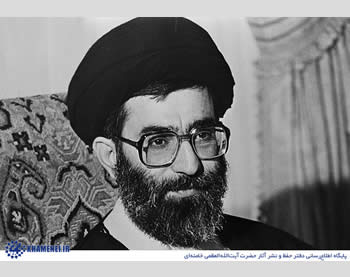
Supreme Leader Ali Khamenei during his presidential term, at the time of the Iran-Iraq War
Overview
1. On July 17, 2012, Iran commemorated the anniversary of the decision made by Iran’s Supreme Leader Ayatollah Ruhollah Khomeini to agree to a ceasefire with Iraq. Khomeini’s strategic decision, which brought an end to the eight-year war between the two countries, was made on the basis of U.N. Security Council Resolution 598 from 1988. The anniversary of Khomeini’s decision was marked by an extensive and rather uncharacteristic focus by Iran’s media and top regime officials on his agreement to the ceasefire.
2. The official website of Khamenei, the Supreme Leader, expressed his support for adopting Security Council Resolution 598, which ended the war, justified it, and discussed the achievements that were made possible thanks to its adoption.Khamenei stressed that the decision to agree to the ceasefire had nothing to do with fear of Iraq or American threats—instead, the decision was driven by domestic reasons, chiefly the understanding that the decision was beneficial to Iran’s interests and Khomeini’s recognition of the Iranian economic difficulties.
3. It is our assessment that the support for Khomeini’s decision and Khamenei’s remarks on Iran’s need to integrate both revolutionary idealism and realism in its policy vis-à-vis the West[1] are not necessarily indicative that the Iranian regime intends to prepare the ground for a compromise with the West on the nuclear issue. However, the extensive media discourse on this issue may indicate the emergence ofan understanding in Iran that the country’s leadership is facing a strategic moment of decision similar to that faced by the revolution leader in 1988. At such decisive moment, like his predecessor, Khamenei may be required to decide whether he is willing “to drink from the poisoned chalice”.
4. See Appendix for details on the media discourse on Ayatollah Khomeini’s agreement to the ceasefire with Iraq.
[1] Speaking at a convention of top regime officials on July 24, 2012, Supreme Leader Khamenei announced that the combination of idealism [of the Islamic revolution] and realism [i.e., pragmatism] was the “secret” behind the progress made by Iran and the Islamic commonwealth of nations for 32 years. He also noted that the pressure exerted on Iran is part of an ongoing reality with which Iran has to contend, but that the enemy’s pressure will not throw Iran off its course (IRNA, Tehran, July 24, 2012).






